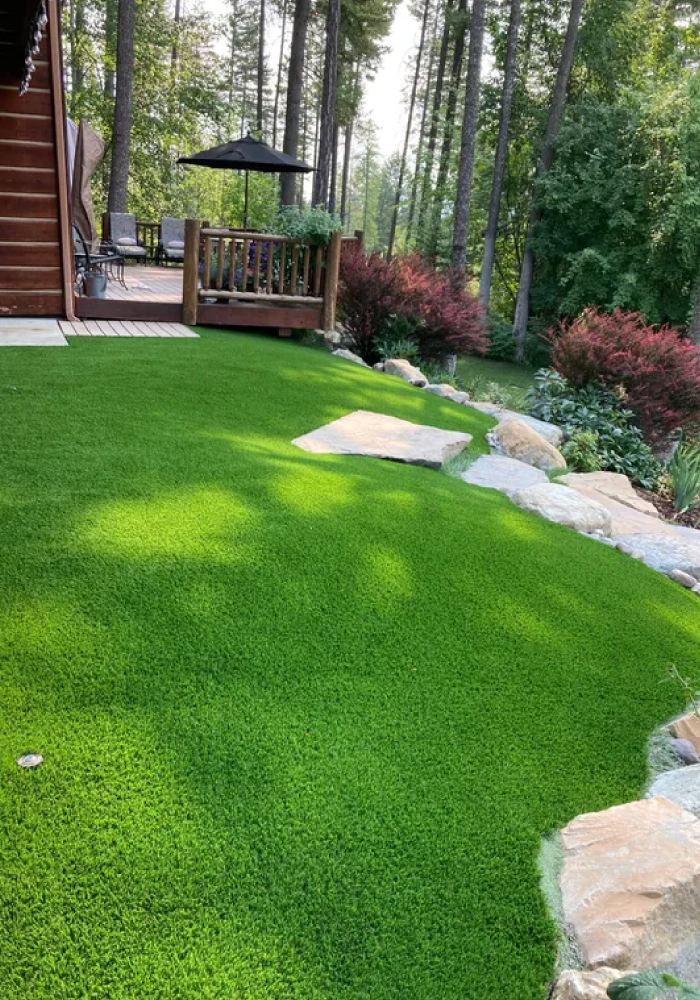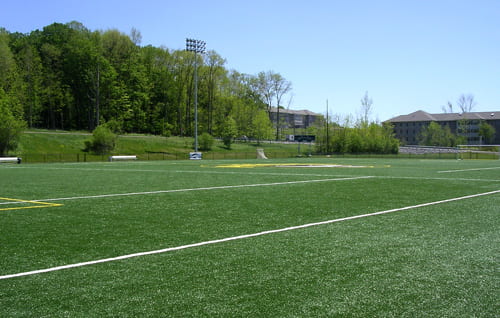Transform Your Outdoor Space with Arizona Artificial Turf for a Lush Green Look
Transform Your Outdoor Space with Arizona Artificial Turf for a Lush Green Look
Blog Article
Look Into the Environmental Conveniences of Opting for Synthetic Grass Solutions
The fostering of man-made lawn remedies provides a compelling possibility to resolve pressing environmental difficulties. By significantly minimizing water usage and minimizing the application of damaging chemicals, these alternatives not only promote lasting landscape design yet additionally safeguard regional ecological communities. The reduced carbon footprint linked with reduced maintenance tasks contributes to a much more sustainable method to land management. The effects of these benefits prolong past simple conservation efforts, raising questions about their lasting effect on environment conservation and general ecological balance. Exploring these measurements reveals an intricate interaction worth thinking about.
Water Preservation Perks
One of the most considerable advantages of synthetic turf is its ability to save water. In contrast, synthetic turf does not need watering, significantly lowering the total demand for water resources.
By eliminating the demand for routine watering, man-made turf adds to sustainable landscape practices and aids alleviate the ecological effect of extreme water consumption. The conservation of water prolongs to the reduction of drainage, which can lead to soil erosion and river air pollution.
In addition, the setup of synthetic grass allows house owners and municipalities to designate water resources a lot more effectively, concentrating on essential uses such as alcohol consumption water and farming. The change in the direction of fabricated lawn not only advertises liable water usage however likewise lines up with more comprehensive ecological goals focused on preserving all-natural resources.
As areas significantly prioritize sustainability, the water conservation benefits of artificial lawn provide a compelling case for its fostering in business and property landscape design jobs.
Decreased Chemical Usage
The shift to synthetic grass significantly reduces the dependence on chemical treatments typically utilized in natural yard upkeep. Typical grass administration generally involves the application of herbicides, pesticides, and fertilizers to advertise growth and control pests. These chemicals can position risks to human wellness, neighborhood wildlife, and the atmosphere, adding to dirt and water contamination.
In contrast, synthetic lawn gets rid of the requirement for these harmful materials. By minimizing the release of synthetic substances right into the community, synthetic lawn promotes much healthier soil and water systems.
Moreover, the lack of chemical runoff linked with artificial turf installments aids safeguard neighborhood rivers from air pollution, supporting marine life and keeping biodiversity. Turf installation phoenix az. As neighborhoods significantly prioritize sustainable techniques, choosing synthetic grass offers a sensible service that straightens with ecological conservation objectives. With this change, homeowner can enjoy rich environment-friendly areas without jeopardizing eco-friendly wellness, leading the way for a more lasting future
Reduced Carbon Footprint

Moreover, the setup of artificial grass can lead to substantial water preservation. Natural yards need substantial amounts of water for irrigation, which not just contributes to the carbon footprint associated with water removal and therapy yet additionally stress local water sources. On the other hand, synthetic grass needs minimal upkeep, calling for no watering, thus dramatically reducing water use and its connected power costs.
In addition, the long life of synthetic lawn adds to its decreased carbon impact. With a life expectancy of approximately 15 years or even more, the requirement for regular replacements is lessened, leading to less waste and lower power usage in manufacturing and throwing away typical turf options. Overall, synthetic grass provides a lasting alternative for eco conscious landscape click this link design.
Environment Conservation
Environment conservation is an essential consideration in the debate over landscape design choices, specifically when comparing man-made grass to all-natural yard. All-natural turf lawns typically require substantial upkeep, including using chemicals, fertilizers, and herbicides, which can adversely impact regional environments. These chemicals can seep into the soil and rivers, damaging native vegetation and fauna and disrupting neighborhood habitats.
On the other hand, synthetic grass offers a chance to reduce the environmental impact of landscape design. By selecting synthetic yard, house owners can minimize the interruption of natural habitats connected with traditional lawn care methods. Synthetic grass removes the requirement for dangerous chemicals, consequently protecting close-by wild animals and preserving the stability of surrounding ecological communities. The setup of artificial grass can lead to the conversion of previous yard locations into more biodiverse landscapes, such as pollinator gardens or native plant locations, which can sustain regional wildlife.
Ultimately, the transition to synthetic grass not only conserves water and reduces maintenance initiatives but additionally cultivates a much more unified relationship between human activities and the natural atmosphere, advertising habitat conservation at the same time.
Long-Term Sustainability
Lasting sustainability is a crucial consider evaluating the benefits of synthetic grass over traditional grass yards. One of one of the most considerable benefits of synthetic turf is its resilience; it can last approximately 15-20 years with minimal upkeep, whereas natural lawn calls for frequent reseeding and substitute. This durability lowers the need for continuous sources, such as water, fertilizers, and chemicals, which are essential for keeping a healthy turf yard.
In addition, synthetic grass adds to a reduction in carbon discharges related to lawn care equipment. Typical yards commonly require gas-powered lawn mowers, trimmers, and blowers, every one of which contribute to air contamination. Turf installation phoenix az. On the other hand, synthetic grass eliminates the requirement for such equipment, promoting a cleaner environment
In addition, the manufacturing of synthetic turf significantly utilizes recycled products, improving its sustainability account. As suppliers take on environmentally friendly practices, the environmental impact of synthetic grass remains to diminish.

Conclusion
The adoption of synthetic grass solutions offers considerable environmental advantages, including considerable water conservation, decreased dependence on unsafe chemicals, and a reduced carbon footprint. In addition, synthetic grass aids in protecting natural habitats by minimizing land disruption and advertising long-lasting sustainability through the use of resilient materials. Jointly, these elements emphasize the capacity of synthetic grass to add positively to ecological health and provide our website a feasible choice to typical landscaping techniques in a significantly resource-conscious globe.
In comparison, man-made turf does not need watering, substantially minimizing the general demand for water sources. By decreasing the release of synthetic compounds right into the community, fabricated lawn advertises much healthier dirt and water systems.
Additionally, the installation of artificial turf can result in significant water conservation. In contrast, man-made lawn needs marginal upkeep, requiring no watering, therefore significantly decreasing water use and its associated power you could try here costs.

Report this page